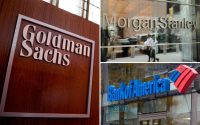Wall Street titans warn of crisis after SVB’s failure
Wall Street titans are sounding alarms about a crisis brewing in the global financial sector following the implosion of Silicon Valley Bank.
The warnings from business luminaries including Larry Fink, Ray Dalio, and Carl Icahn come as the collapse of SVB and signs of trouble at Credit Suisse reignite fears of global contagion – even as economies contend with slowing growth and lingering inflation.
Fink, the 70-year-old CEO of investment giant BlackRock, raised the possibility that the current upheaval caused by SVB’s failure could be the start of a “slow-rolling crisis” – similar to what transpired during the savings and loan crisis of the 1980s and early 1990s.
“We don’t know yet whether the consequences of easy money and regulatory changes will cascade throughout the U.S. regional banking sector (akin to the S&L Crisis) with more seizures and shutdowns coming,” Fink said in his closely-watched annual shareholder letter on Wednesday.
Fink added that markets are currently paying the prices for “years of easy money” following the Federal Reserve’s series of sharp interest rate hikes over the last years.

“Asset-liability mismatches,” such as what SVB experienced prior to its downfall, could be the “second domino to fall,” according to the billionaire. Prior to its collapse, SVB disclosed a $1.8 billion loss after it was forced to conduct a fire sale of its $21 billion in bold holdings.
Fink warned it is “inevitable” that some banks will “pull back on lending to shore up their balance sheets.”
Funds that made more “illiquid investments” during the period of easy monetary policy could be the “third domino to fall,” he added.

Dalio called SVB’s downfall a potential “canary in the coal mine” that will have a harmful impact on the venture capital world and “well beyond it.”
Dalio noted that banks are forced to eat losses on assets that have lost value due to a recent surge in interest rates.
More federal intervention – such as regulators’ move to backstop deposits at SVB and fellow doomed firm Signature Bank – could be next, the Bridgewater Associates founder added.

“Looking ahead, it’s likely that it won’t be long before the problems pick up, which will eventually lead the Fed and bank regulators to act in a protective way,” Dalio wrote in a blog post Tuesday.
“So I think we are approaching the turning point from the strong tightening phase into the contraction phase of the short-term credit/debt cycle,” he added.
Critics of the feds’ move to guarantee deposits at SVB – whether insured or not – have argued it is effectively a bailout that will eventually land on American taxpayers.

Earlier this week, billionaire hedge fund boss Ken Griffin slammed the Biden administration-backed bailout as a major misstep.
The US is supposed to be a capitalist economy, and that’s breaking down before our eyes,” Griffin told the Financial Times.
“There’s been a loss of financial discipline with the government bailing out depositors in full,” he added.

Famed activist Carl Icahn concurred with Griffin’s view on the bailout, asserting on CNBC’s “Closing Bell” on Tuesday that economic problems began long before the last few days.
“He’s right that our system is breaking down, and we absolutely have a major problem in our economy today,” Icahn said.
“I’m not going to opine on whether or not you bail out a bank, but you can’t have the country feeling that it doesn’t matter if they save, it doesn’t matter, because they could spend all the money they want, you can do whatever you want because the government will bail you out,” Icahn added.
“He’s right about that, you can’t have that.”


